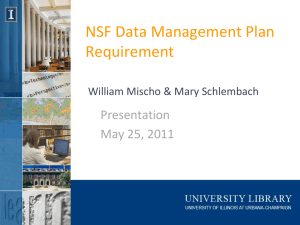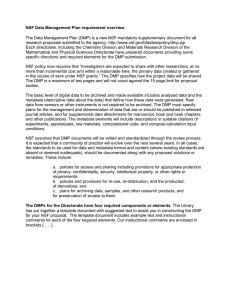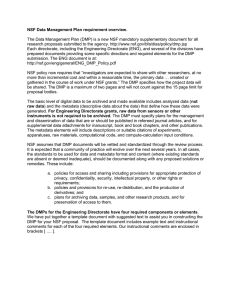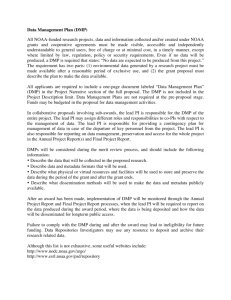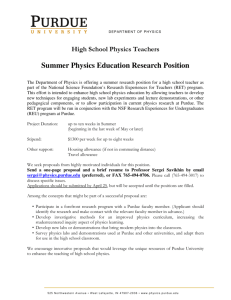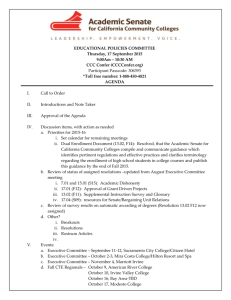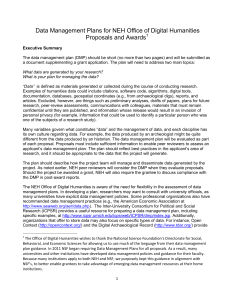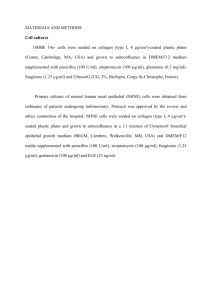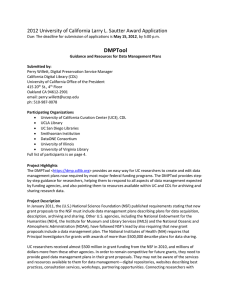Tao_Zhang_-_DMPTool
advertisement
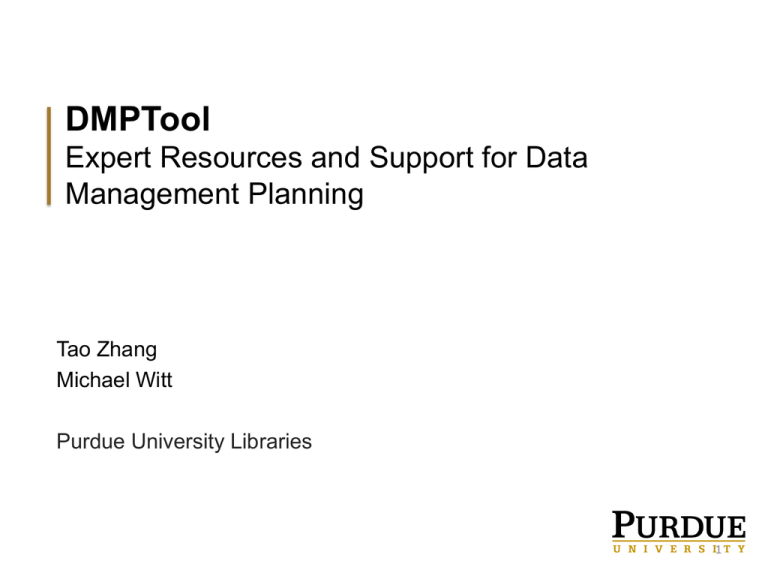
DMPTool Expert Resources and Support for Data Management Planning Tao Zhang Michael Witt Purdue University Libraries 1 What is a DMP? A document that describes what you will do with your data during your project and after you complete your research. From Flickr by robnguyen01 (CC BY-NC-SA-2.0) 2 Why prepare a DMP? • Saves time • Increases research efficiency – Ensures you & others will be able to understand & use data in future – Prevents duplication of effort • Satisfies funding agency requirements From Flickr by natalinha (CC BY-NC-SA 2.0) 3 NSF DMP Requirements From Grant Proposal Guidelines: Plans for data management and sharing of the products of research. Proposals must include a supplementary document of no more than two pages labeled “Data Management Plan”. This supplement should describe how the proposal will conform to NSF policy on the dissemination and sharing of research results (in AAG), and may include: 1. the types of data, samples, physical collections, software, curriculum materials, and other materials to be produced in the course of the project 2. the standards to be used for data and metadata format and content (where existing standards are absent or deemed inadequate, this should be documented along with any proposed solutions or remedies) 3. policies for access and sharing including provisions for appropriate protection of privacy, confidentiality, security, intellectual property, or other rights or requirements 4. policies and provisions for re-use, re-distribution, and the production of derivatives 5. plans for archiving data, samples, and other research products, and for preservation of access to them 4 NSF’s (unofficial) Vision DMPs and their evaluation will grow & change over time (similar to broader impacts) Peer review will determine next steps Community-driven guidelines – Different disciplines have different definitions of acceptable data sharing – Flexibility at the directorate and division levels – Tailor implementation of DMP requirement Evaluation will vary with directorate, division, & program officer 5 Research & Data Management Planning are Inter-related, Iterative Processes Plan Proposal writing Ideas Research Cycle Collect Analyze Research Integrate Data Life Cycle Discover Publication Assure Describe Preserve 6 How do you develop a plan? From Flickr by darkuncle (CC BY-2.0) 7 How: Understand the Context • • • Clarify the purpose of your research & the data it will produce Identify the impact and risks associated with the data collection Determine which sides of the triangle are flexible Project Scope 8 How: Revisit & Continuously Improve • Incorporate changes to keep your plan current • Use the plan as a guide for daily activities Continuous Improvement 9 How: Use DMPTool (dmptool.org) Step-by-step wizard for generating DMP Create | edit | re-use | share | save | generate Open to community Links to institutional resources Directorate information & updates 10 11 12 13 14 15 16 17 18 19 20 21 Improvements in 2013 Granular modeling of plan templates Organizational planning activities Granular modeling of institutions Enhanced search and browse Advanced administrative interface Role-based user authorization DMP life cycle management Institutional branding Search and reporting for business intelligence Collaborative plan creation Open API DMPTool 2: Responding to the Community 22 DMPTool2: Responding to the Community For administrators: Plus… • Better plan template granularity (discipline, • Institutional branding funder, question) • Open API • Better institution granularity (department, college, lab group, …) • Role-based user authorization & access • Enhanced search and browse of plans • Access to metrics for reporting & follow-up For plan creators: • • • • DMP life cycle management Collaborative plan creation Role-based user authorization & access Better plan templates & resources 23 Questions? • Visit dmptool.org • Latest DMPTool 2 design: http://ux.cdlib.org/mstrong/dmptool2_wf_0816/ Tao Zhang Digital User Experience Specialist Purdue University Libraries zhan1022@purdue.edu Michael Witt Interdisciplinary Research Librarian Purdue University Libraries mwitt@purdue.edu 24
